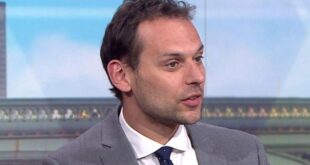New “recovery” contracts have been granted to Britain’s rail companies, marking the end of the franchising model introduced in the mid-1990s.
Taxpayers will continue to cover losses made by operators for the next 18 months ahead of the creation of a “simpler and more effective structure”, the Department for Transport (DfT) said.
Emergency measures introduced in March to ensure services kept running despite the collapse in demand caused by the coronavirus pandemic cost the Government at least £3.5 billion.
They have been replaced by Emergency Recovery Management Agreements (ERMAs), which operate in a similar way but mean operators have tougher performance targets and lower management fees.
Transport Secretary Grant Shapps said the virus has “proven” that the existing franchising model “is no longer working”.
He did not set out exactly how control of rail services will be determined once ERMAs expire, but described how the new system will “keep the best elements of the private sector” such as competition and investment.
He went on: “Passengers will have reliable, safe services on a network totally built around them.”
Matthew Gregory, chief executive of FirstGroup, which owns four franchises, called for “a more appropriate balance of risk and reward for all parties”.
He said: “We have long advocated for a more sustainable long-term approach to the railway, with passengers at its centre, and we look forward to working constructively with the DfT to make this a reality.”
RMT responds to Government’s extension of Emergency Measures Agreements on UK rail franchiseshttps://t.co/rjx5O43s2x pic.twitter.com/B1zQP1Wqgw
— RMT (@RMTunion) September 21, 2020
But Labour’s shadow rail minister, Tan Dhesi, claimed it was “completely unacceptable” that taxpayers will continue to pay “hundreds of millions of pounds” in management fees to private companies.
He added: “These agreements paper over the cracks of a broken rail system. It’s time to put passengers before profit and bring our rail franchises back into full public ownership.”
Transport Salaried Staffs’ Association general secretary Manuel Cortes said: “Sadly, it looks like the Government is once again kicking into the long grass what to do with our railways, and instead of grasping the nettle is opting for transitional measures which prop up the status quo.”
Most train services in Britain have operated as franchises since the railways were privatised around 25 years ago.
These involve the DfT setting out the terms of service required and private firms submitting bids.
The Government has taken over control of services on several routes when franchises have run into financial or performance problems and currently operates Northern Trains and London North Eastern Railway.
The chaotic introduction of new timetables in May 2018 led the DfT to commission Royal Mail chairman Keith Williams to carry out a review of the railways.
The department described Monday’s announcement as a “prelude” to the Government’s white paper which will respond to the review’s recommendations and will be published “when the course of the pandemic becomes clearer”.
Mr Williams said: “These new agreements represent the end of the complicated franchising system, demand more from the expertise and skills of the private sector, and ensure passengers return to a more punctual and co-ordinated railway.
“I am ensuring the recommendations I propose are fit for a post-Covid world, but these contracts kick-start a process of reform that will ensure our railways are entirely focused on the passenger, with a simpler, more effective system that works in their best interest.”



